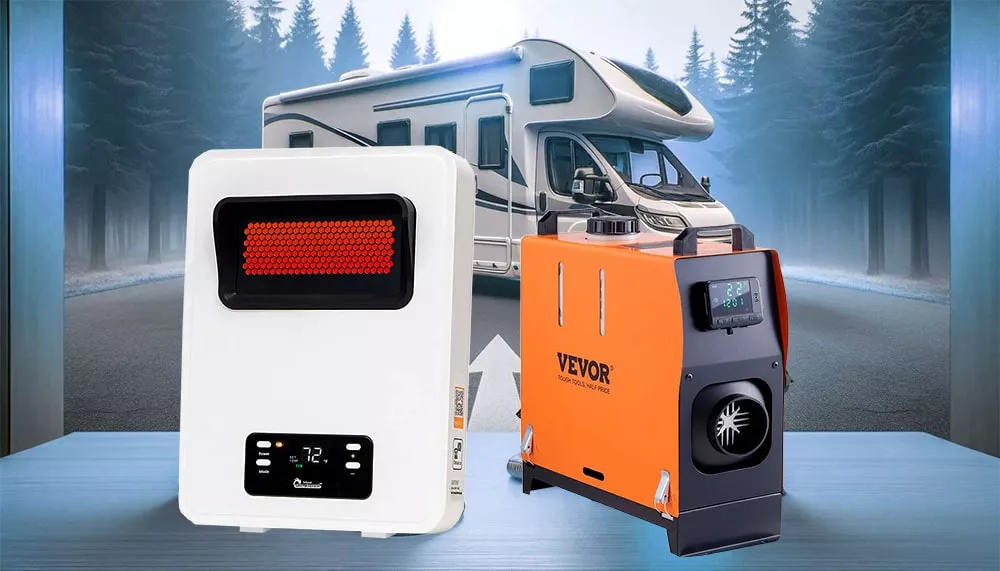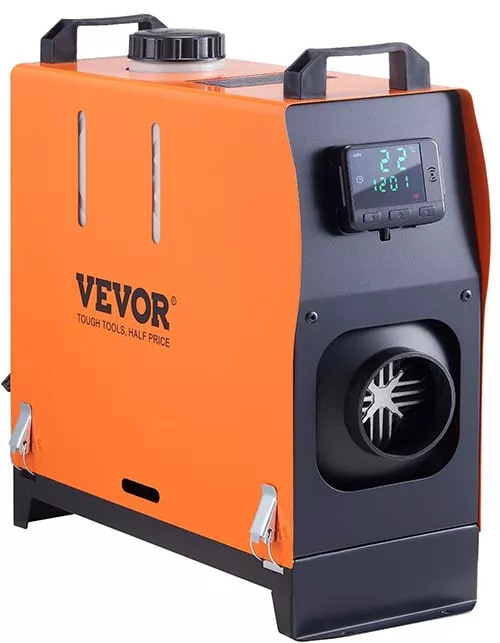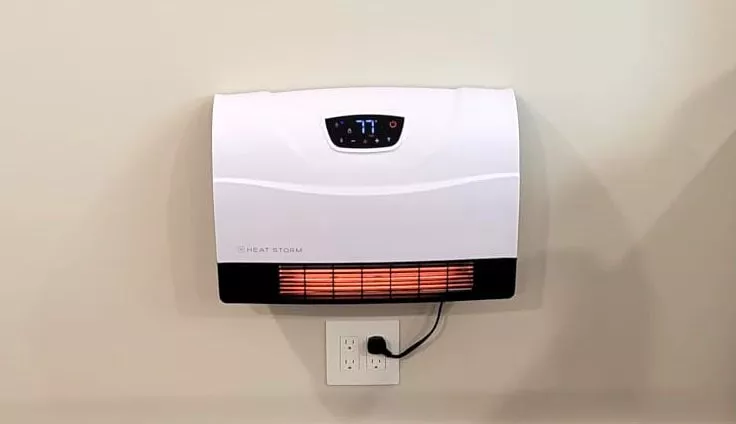When you’re getting your RV ready for trips, picking the right heater is a big deal. It’s all about staying warm and cozy.
A lot of van travelers wonder whether to go with a diesel heater or an electric one. Diesel heaters are great for pumping out a lot of heat, but setting them up and keeping them running takes some work.
Electric heaters are easier to use and quieter, but they might not give you as much warmth and need a steady electric supply. Which one is better really depends on where and how you plan to use your van.
In this article, we’ll look at both diesel and electric heaters for camper vans / motorhomes / and RVs.
We’ll talk about what’s good and not so good about each, and when it’s best to use one over the other.
By the end, you’ll get a good idea of which heater fits your van life better and how to make the most of it for staying warm.
Diesel Heaters for RVs
Diesel heaters in RVs work by burning diesel fuel to create heat. This heat is then blown into your RV through a vent, warming up the space. They have a fuel tank, a burner where the diesel gets heated, and a fan to spread the warmth. You control the heat with a thermostat, just like your heater at home.
Why you should use a Diesel Heater in your RV
- Lots of Heat: Depending on the model, diesel heaters output up to 5,000 Watts of heat, which is more than 3 times more heat than a standard 1500W electric heater.
- Efficient for Off-Grid: While they do use a bit of electricity from your RV’s battery, they primarily run on diesel. This makes them ideal for off-grid camping, as they don’t rely heavily on electrical hookups.
- Fuel Usage: On average, a diesel heater might use about 0.1 to 0.3 gallons of diesel per hour, depending on the model and the heat setting. So, over the course of a night (let’s say 8 hours), you could expect to use approximately 0.8 to 2.4 gallons of diesel (depending on the heat setting).
That’s quite something. But it’s a lot more cost-effective than using expensive electricity!
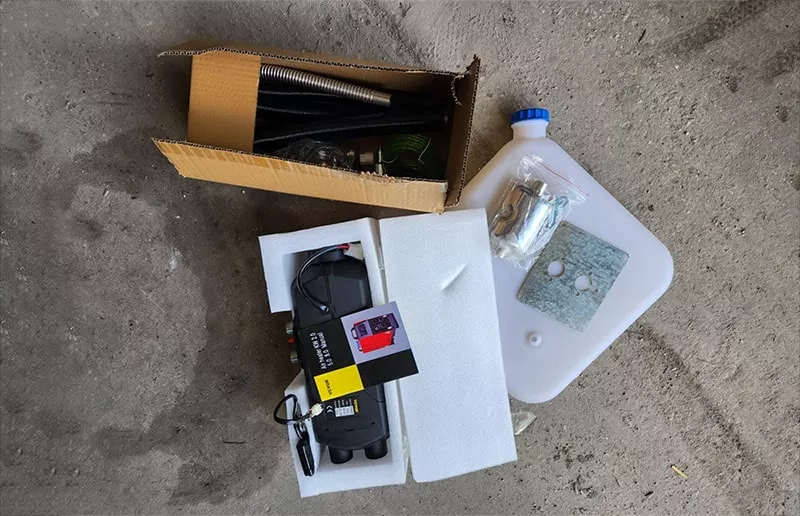 Diesel heater unboxing: A new diesel heater comes with a tank and a set of fuel lines and exhausts.
Diesel heater unboxing: A new diesel heater comes with a tank and a set of fuel lines and exhausts.
Downsides of Diesel Heaters
- Installation: Setting them up can be a bit of a project since diesel heaters consist of many parts. They need electric connections and you need to layout the exhaust pipe. Luckily, there are many video guides on YouTube you can follow along.
- Maintenance: Because diesel heaters burn diesel, which is a chemical reaction, diesel heaters need regular checks and cleaning to keep them working well. Otherwise, soot builds up and clogs the airways which reduces heating efficiency or even stops the heater from heating.
- Noise: Diesel heaters are noisy! There are moving parts inside them that create noise. First and foremost, the fuel pump. But then, there’s also the blower and the combustion chamber. None of which are silent.
Best Usage Scenarios for Diesel Heaters
- Cold Climates: If you’re traveling to really cold places, a diesel heater will keep your RV cozy and warm. You only need to make sure the diesel fuel is prepared for the cold weather. Otherwise, it thickens up which is called “fuel gelling”. Check out this guide on how to reduce diesel fuel gelling.
- Off-Grid Adventures: When you’re out in nature away from campgrounds or RV parks, these heaters are great because they only need a small amount of electricity to start the diesel combustion process. Aside from that, you can consider diesel heaters offgrid-friendly.
- Long Trips: For long road trips or full-time RV living, diesel heaters give you a lot of heat for a longer time without needing a refill.
Also, storing heat energy is very simple. Just carry an additional diesel tank with you. There’s no need for expensive battery packs etc.
In short, diesel heaters are a strong choice for keeping your RV warm, especially when you’re traveling in cold areas or places without electricity.
Recommended Diesel Heater for RVs
To be very honest, most diesel heaters you find online are the same. They are all relatively cheap Chinese-made heaters. But they work. So, it doesn’t really matter which one you pick. The differences between the individual models are very small. Sometimes, it’s only the logo that changes.
So, I’d just pick a popular model with a decent rating. So, if the heater ever has a problem, you can easily look it up online:
My recommendation is this Vevor diesel heater(click to view it on amazon). It’s a 5kW model, which is more than enough for most regular-sized camper vans and motorhomes. For large motorhomes, just pick the 8kW variant.
Electric Heaters for RVs
Electric heaters in RVs are all about simplicity and convenience. They work by using electricity to heat up a heating element, for example a coil or an infrared tube, which then radiates the heat into your RV.
Electric heaters are plug-and-play, meaning you just plug them into an electrical outlet in your RV, and they start heating.
Most come with a thermostat and different heat settings, so you can control the temperature easily.
Why You Should Use an Electric Heater in Your RV
- No installation required: Electric heaters are super user-friendly. Just plug them in, turn them on, and you’re good to go. No complex setup or installation.
- Completely quiet: Unlike diesel heaters, electric heaters are quiet. They don’t have any loud parts like pumps, and thus heat without the noise. Of course, if you pick a heater with a built-in fan, you get some fan noise. But infrared heaters (I’ll recommend you one later), are usually 100% silent.
- Clean Heating: They don’t burn fuel, so there’s no soot or exhaust to worry about.
- Fuel Usage: Electric heaters consume electricity, which is a downside if you’re off-grid.
The typical electric heater uses around 1,500 Watts of power. So, if you’re using your RV’s battery, it’ll drain quickly.
However, when you’re at a campground with hookups, it’s perfect - you can heat your RV without worrying about refueling or battery drain.
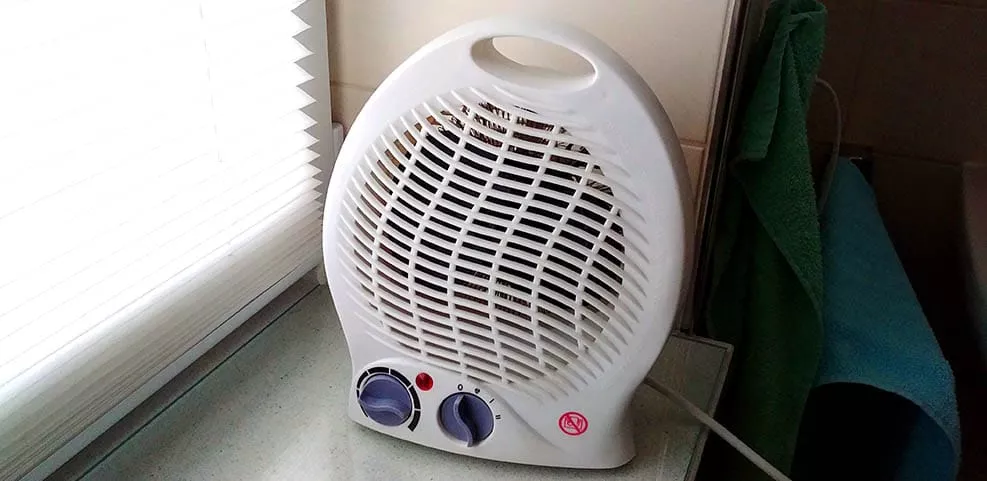
Downsides of Electric Heaters
- Limited Heat Output: Electric heaters max out at 1500 Watts. (Except you’re in Europe. There you can find stronger heaters up to 2,500 Watts)
So, electric heaters are not ideal for heating larger spaces or in very cold conditions. - Reliance on Electricity: You need a steady supply of electricity. If you’re off-grid, you will need a generator or a large battery bank with an inverter.
Best Usage Scenarios for Electric Heaters
- Mild Climates: In areas where it doesn’t get extremely cold, an electric heater can keep your RV cozy without needing the intense heat of a diesel heater.
- Short Trips and Campgrounds: Perfect for short trips or when you’re staying at campgrounds with electrical hookups.
- Supplemental Heat: They’re great as a secondary heat source. Use them to boost warmth along with your RV’s built-in heating system or a diesel heater.
Recommended Electric Heater for RVs
For electric heaters, the key is finding a balance between size, power, and safety features. My favorite pick is this Heat Storm infrared heater (click to view it on amazon).
This one stands out from all other infrared heaters because it comes with a built-in thermostat and auto-mode, which lets the heater completely control itself.
Just set a temperature, and the Heat Storm will take care. That’s perfect for RVs.
And best of all, the Heat Storm infrared heater is wall-mountable, so it doesn’t take up any floor space.
In summary, electric heaters are all about ease and convenience. They’re great for certain situations like staying at campgrounds or in milder weather. Just plug them in, and you have a comfortable, warm RV without much fuss.
Diesel vs Electric Heaters for RVs: A Side-by-Side Look
When it comes to heating your RV, choosing between a diesel and an electric heater involves considering several factors. Here’s a straightforward comparison to help you weigh your options:
Heating Power:
- Diesel Heaters: Deliver up to 5,000 Watts, making them powerful enough to heat larger spaces and cope with extreme cold.
- Electric Heaters: Typically offer up to 1,500 Watts (2,500 Watts in Europe), suitable for milder climates and smaller spaces.
Where You Get Power From:
- Diesel Heaters: Run on diesel fuel, which is readily available and ideal for off-grid situations. They do use a small amount of electricity from the RV’s battery for ignition and operation.
- Electric Heaters: Depend on an electrical source, like a campground hookup or a generator. They’re ideal when you have steady access to electricity.
Setting Up and Taking Care of Them:
- Diesel Heaters: Require initial installation, which can be complex. They need regular maintenance like cleaning to prevent soot buildup and to ensure efficient operation.
- Electric Heaters: Are plug-and-play with no installation needed. Maintenance is minimal, mostly just basic cleaning.
How Much They Cost:
- Diesel Heaters: The upfront cost is usually higher with diesel heaters.A good quality diesel heater can cost anywhere between $150 - $600. Running a diesel heater for one night costs between $2 and $8, depending on the heat setting and the diesel price.
- Electric Heaters: Typically have a lower upfront cost and cost between $50 - $200. When hooked up at campgrounds, where electricity is often included in the site fee, the running cost can be negligible. Off-grid, electric heater running costs can be high due to the need for a generator or large battery bank.
In general, you should plan $1 - $6 per night for electric heaters (accounting for the increased electricity cost at campgrounds and off-grid). But remember that electric heaters output much less heat!
Quick Lookup Table:
| Feature | Diesel Heater | Electric Heater |
|---|---|---|
| Heating Power | Up to 5,000W | Up to 1,500W (2,500W in Europe) |
| Power Source | Diesel fuel + minimal electricity | Electrical hookup, generator, or battery |
| Installation & Maintenance | Complex setup; regular maintenance required | No installation; minimal maintenance |
| Cost | Higher upfront; more efficient in the long run | Lower upfront; cost varies with electricity source |
Conclusion
In conclusion, the choice between diesel and electric heaters for your RV depends on your travel style, where you plan to stay, and how much warmth you need. Diesel heaters are great for off-grid adventures and colder climates, while electric heaters are convenient for short trips, mild weather, and when you have easy access to electricity.
